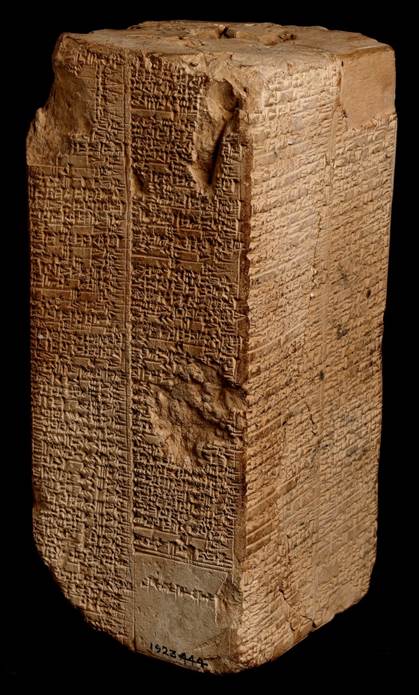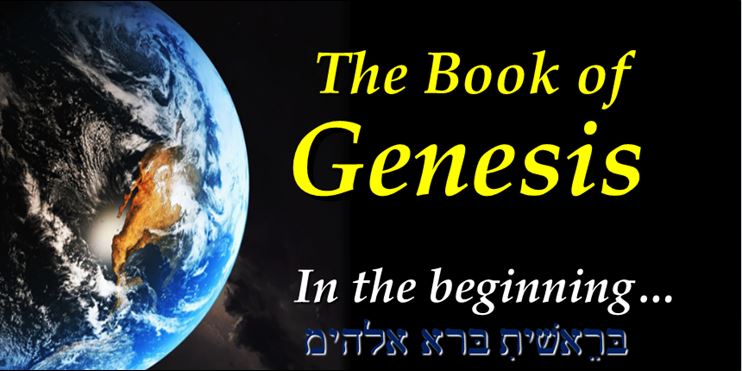Acts 14:17 tells us that God has not leftHimself without a witness. It should, therefore, come as no surprise that when we come to a passage like Genesis 5, one that has been heavily attacked and ridiculed by critics of the Bible, we find it vindicated by both the witness of archaeology, and by incredible deliberate design built into text, all of which attest to its authenticity as the very Word of God.
Genesis 5 gives us the genealogy from Adam to Noah, both of whom Jesus spoke of as real historical characters (Matt 10:4 / Luke 17:26). Yet the critics have been quick to tell us that the long lifetimes recorded in this chapter are nothing but fiction. However, in the 19th century, a number of cunieform tablets were discovered that not only seemed to corroborate the long lifetimes recorded before the Flood, but now, thanks to the excellent scholarship of Dr Bill Cooper, have yielded another remarkable discovery. 
The cunieform tablets in questions are collectively known as the Sumerian King List, one of the principle finds being WB 444, also known as the Weld-Blundell Prisim which currently resides at the Ashmolean Museum in Oxford (UK).
The list gives us 8kings who ruled over 5 cities before “the Flood swept thereover”. This on its own is very interesting, as here we have an independent witness that speaks of the world that then was being destroyed by a flood, just as detailed in Genesis 6-9. However, the list also records a dramatic decrease in the life-spans of those listed after the Flood when compared to the kings before the Flood.
Now, all of this was actually known over 2000 years ago, although the critics chose to ignore it! In around 280 B.C. the Babylonian priest, Berosus, was asked by Antiochus I to translate a list of these Sumerian Kings into Greek. Up until the recent discoveries, this list of Berosus was considered spurious and not taken seriously. Probably because it gave too much credence to the Biblical account! Critics (ever struggling to hold their ground) point out that the ages of the kings in the list are impossible as there are even more ‘far fetched’ than the Biblical account. The oldest king in the list is said to have reigned for 43,200 years. However, neither Berosus in his Greek translation nor the other cuneiform documents mention years – something the critics know but choose to ignore! The unit of measurement is actually ‘saros’ (and more specifically ‘sari’. The Sumerians used a ‘sexagesimal’ system of mathematics (based on the number 60). Dr Bill Cooper comments:“Berosus wasn’t giving us a period of time measured in years, but one that is measured in Lunar months, and the 7-day units of those months”….“Well, 60 months equal 5 years, and if we divide 432,000 by 5 we are left with the product of 86,400, which happens also to be the number of weeks in the 1,656 years Genesis gives us”! This is remarkable!! Here we have a secular list dating back over 4000 years that gives exactly the same time period from Creation to the Flood as recorded in detail in the Bible – in Genesis chapter 5.
“So once again, and in distinct contradiction to all that the modernists say, Genesis shows itself to be the older and by far the purer account. Moreover, the longevity of its patriarchs – a point of much scoffing in the modernist camp – is seen to be corroborated to a surprising degree by two independent and very ancient sources” – The Authenticity of Genesis, by Dr Bill Cooper, available from:www.genesisexpo.org.uk
If that is impressive, the next thing we will look at here is truly outstanding and gives undeniable proof that the Bible is from outside our time domain and is the work of a God who “knows the end from the beginning” (Isiah 46:9-10).
Our list in Genesis 5 begins with Adam, whose name in Hebrew simply means ‘man’. It is interesting to note that whilst Adam was made in God’s image, his son, Seth, we are told was made in the image and likeness of Adam. Only Adam and Christ (His physical body) were directly created by God. For this reason, Paul, in Romans 5, calls Jesus the 2nd Adam. Both Adam and Jesus were sinless. Adam failed and brought death into the world. Jesus overcame sin & the devil and brought everlasting life to all who will receive Him.
The next in our genealogy is Seth. We are told in Genesis 4:25 that Seth means “Appointed” – “and she bare a son, and called his name Seth: For God, said she, hath appointed me another seed instead of Abel, whom Cain slew”.
At the end of chapter 4 we noted that it was in the days of Seth’s son Enos that “men began to [profane] the name of the Lord”. Why would this be? With Adam still alive and memories of the Garden of Eden still vivid, how could man turn so quickly away from God to the extent that they would blaspheme His holy name? The clue is given throughout this chapter, at the end of every sentence, for there we read “…and he died” (with the exception of Enoch whom we’ll get to in a moment!). For the first time, fledgling humanity is brought face to face with the reality of death. Yes, Abel had died at the hand of his brother, but at some point in these verses, we would have had the first person to die of natural causes. That must have been terrifying. It is curious how death so often has one of two reactions: either it draws us closer to God, or it causes deep resentment, feeling that death is in some way unfair. Seemingly here, a number of people felt bitterness at the loss of loved ones. Now, it is not necessarily a nice name to give your child, but how applicable then that Seth names his son ‘Enos’, meaning “mortal,” “frail,” or “miserable.” (It is from the root anash, to be incurable; used of a wound, grief, woe, sickness, or wickedness).
It doesn’t get much better with Enos either, as he names his son Kenan, meaning “sorrow,” “dirge,” or “elegy.”
Thankfully, even in the midst of darkness and despair, the Lord is always there, and Kenan, maybe clinging to the hope of Genesis 3:15 and the promise of a Seed to deliver man from this body of death, names his son Mahalalel, which means “blessed” or “praise”; combined with the ending El, the name for God. His name means: “The Blessed God.”
Next, we have Jared, whose name comes from the verb yaradh, meaning “shall come down.” Dr Chuck Missler, among other scholars, suggest that it was during the days of Jared that the Angels ‘who left their first estate’ (Jude 6), and came to take the women of the earth, producing ungodly offspring, first ‘came down’ (we will discuss this in more detail in the coming weeks).
The one exception to this list of death is Jared’s son Enoch. Enoch’s name means ‘teaching’ and significantly, 1 Corinthians 10 tells us that the things that were written aforetime were written for our learning – especially in these last days. Throughout the Old Testament, we see countless models that pre-figure an event that was to take place at some point in the future. It is no coincidence that Enoch was raptured (taken alive from earth to heaven without dying) at one of the darkest periods in the pre-Flood world. Elijah, another who was raptured, was taken to heaven at arguably the darkest time in Israel’s history during the reign of king Ahab and queen Jezebel. There can be no question we are now living at one of the darkest times spiritually the world has ever known, and the Rapture of the Church is imminent!
It is also fascinating that Enoch’s prophecy [the first one uttered by a prophet in the Bible] is recorded in Jude, and it concerns the return of Jesus at the Second Coming were He is seen coming with His saints to execute judgment on the earth.
Before his rapture, however, Enoch had a son to whom he gave one of the most bizarre names ever! It is a compound name comprising two Hebrew roots. The first is muth, meaning “death”, the second is shalach, which means “to bring,” or “to send forth.”. Literally, Methuselah means “His death shall bring.” We can only wonder at what Enoch’s close relationship and walk with God had revealed to him? But what we do know (with the benefit of hindsight) is that Methuselah’s name and life were a prophecy that spoke of God’s longsuffering in the days leading up to the Flood (see 1 Peter 3:20), for we discover that the very year Methusaleh died was the exact year the Flood came – quite literally, when he died, it came! Methuselah lived longer than any other human being, a stagering 969 years! One again, critics may scoff at so great an age, but we do know the earth was once very different, with greater oxygen content than we have now (which would have a significant effect on the human body); there would have been hardly any disease or sickness, and the water canopy surrounding the earth would have provided protection from solar radiation.
We are not told if Methusalah knew the significance of his name, but he names his son ‘Lamech’ – from whcih we derive the word ‘Lament’. In Hebrew it simply meant ‘despairing’.
But out of all this sadness comes hope. In Genesis chapter 6 we read: “And it repented the LORD that he had made man on the earth, and it grieved him at his heart. And the LORD said, I will destroy man whom I have created from the face of the earth; both man, and beast, and the creeping thing, and the fowls of the air; for it repenteth me that I have made them. But Noah found grace in the eyes of the LORD“ (Gen 6:6-8)
Lamech named his son ‘Noah’ meaning ‘comfort or ‘rest’.“saying, This same shall comfort us concerning our work and toil of our hands, because of the ground which the LORD hath cursed”.(Gen 5:29)
Now, that is an incredible list of names, each one so applicable to their own lives, yet the truely asounding thing is seen when we put all the names together, for when we do we see this:
Man [is] Appointed Mortal sorrow, [but] The blessed God Shall come down Teaching [that] His death shall bring [the] Dispairing Comfort!
That is the Christian gospel concelaed in a geneology in Genesis 5! There is no way Jewish scribes consipred to put the Christian gospel into their beloved TORAH, nor could they have manipulated over 1500 years of history that occured before the nation of Israel had even been born to do this!
The only explanation for this is that God has intentionally conceld this in the names recorded in the text as a proof and demonstration of the supernatural origin of His Word. That means we can trust not only this chapter in its entirity, but also the whole councel of God given to us in the pages of the Bible.
I hope this stirs your hearts and minds to undertake the greatest jourtney of all – to read from Genesis to Revelation though God’s word! If you have never done this, you might find our “Though the Bible in a Year” teaching series beneficial. There are 48 studies that go from Genesis 1 to Revelation 22 complete with Powerpoint slides – all avaialbe for free download on this web site. Just click on the ‘Teaching and Audio link at the top of the home page (or click this link:https://www.calvaryportsmouth.co.uk/sermon-series/through-the-bible/)
Next time… ‘The Flood of Noah’
Every blessing,
Pastor Barry.



